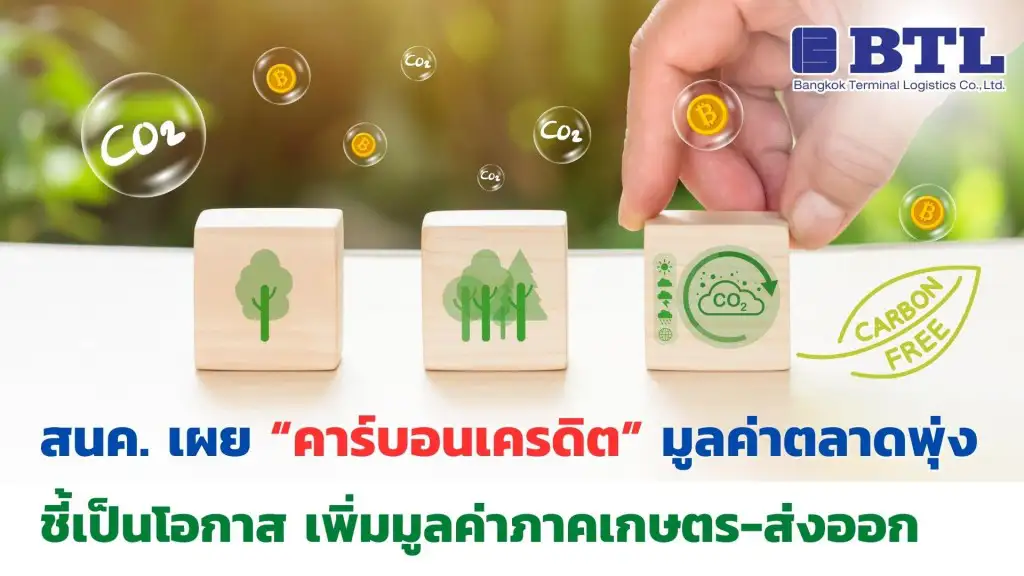



Carbon credits in Thailand are becoming a pollution trading business with the potential to generate huge profits in the future. It is an important mechanism for creating missions.
Refers to rights arising from the reduction of carbon dioxide or greenhouse gas emissions into the environment due to individuals or organizations implementing projects or measures aimed at reducing carbon dioxide or greenhouse gas emissions into the environment.
These rights can be quantified and traded in the carbon credit trading market. For an overview of the global carbon credit market in 2020,
The voluntary carbon market is worth 1.98 billion USD and is expected to reach 25 billion USD or approximately 750 billion baht by 2030, while the demand for carbon credits could be worth 30,000 – 50,000 million USD because carbon credit trading is becoming popular in many countries.
Carbon credits in Thailand are becoming a potential pollution trading business that will generate huge profits in the future. It is an important mechanism for creating the Net Zero mission (net zero greenhouse gas emissions).
It is an incentive for entrepreneurs to cooperate in reducing greenhouse gas emissions. Entrepreneurs who are still unable to reduce their emissions can still make up for it by purchasing carbon credits. This helps create flexibility for entrepreneurs in managing costs effectively and promotes environmental care, increasing opportunities for competition in the global market.
Mr. Poonpong Naiyanapakorn, Director of the Office of Trade Policy and Strategy (OTPS), Ministry of Commerce, revealed that the OTPS has been monitoring the “carbon credit” market, which aims to reduce the environmental impact of greenhouse gas emissions.
It was found that countries have established strategies and measures to control carbon, such as collecting carbon taxes, whether they are taxes from domestic business operations or taxes from importing goods whose production processes emit high carbon, resulting in the trading of carbon credits through the carbon market mechanism so that businesses with high carbon emissions can buy carbon credits to offset carbon emissions as if the purchaser had taken action to reduce the amount of carbon.
Mr. Poonpong said that the increasing demand of the carbon credit market is an opportunity to add value to Thai agricultural businesses because of the planting of 58 species of trees that can be converted into carbon credits, such as neem trees, cherry trees, rain trees, teak trees, paduak trees, phayom trees, cana trees, rain trees, including trees that help drive the BCG economy, such as bamboo and fruit trees such as durian, mangosteen and tamarind.
which is considered an important fruit export of Thailand and a fruit registered as a Geographic Indication (GI) with high added value, including medicinal plants such as mahad and Indian gooseberry, which in addition to being grown for trade can also participate in the voluntary greenhouse gas reduction project according to Thailand’s standards (T-VERs2) in the agricultural sector (fruit orchards), which generates income in many ways, both adding value to the agricultural sector and generating income from selling carbon credits.
In addition, Thailand will have an opportunity to expand its export market, especially products with low carbon emissions, which will have a price advantage over products with high carbon emissions because environmental measures are currently considered modern global regulations that will be increasingly used, which will be an important variable in trade competition to supply major markets such as the United States and the European Union.
Thailand must proactively integrate cooperation from all sectors, prepare the business sector to adapt, and drive policies to achieve the goal of reducing greenhouse gases, such as driving the BCG model to create an economic News S-Curve, including promoting the agricultural sector to reduce greenhouse gases.
Accelerating the commercialization of carbon capture, utilization and storage (CCUS) technologies and improving regulatory legislation
Creating added value of carbon credits and tax benefits, developing market mechanisms for carbon credits both domestically and internationally, and promoting knowledge on participation in T-VERs for Thai agricultural businesses.
Source of information: https://www.posttoday.com/business/692778
————————————————————–
Inquire about BTL services
02-681-2005 to 9